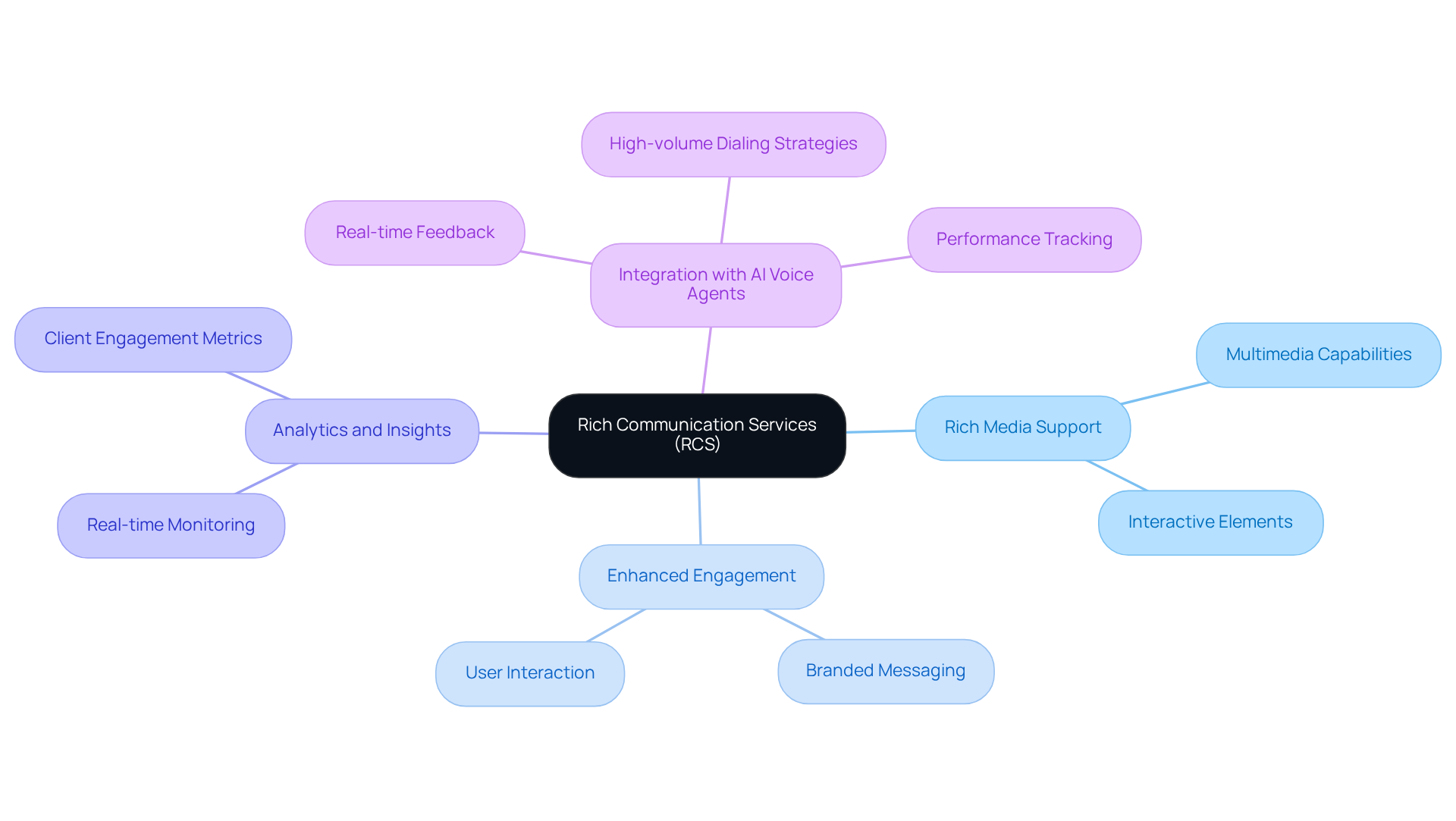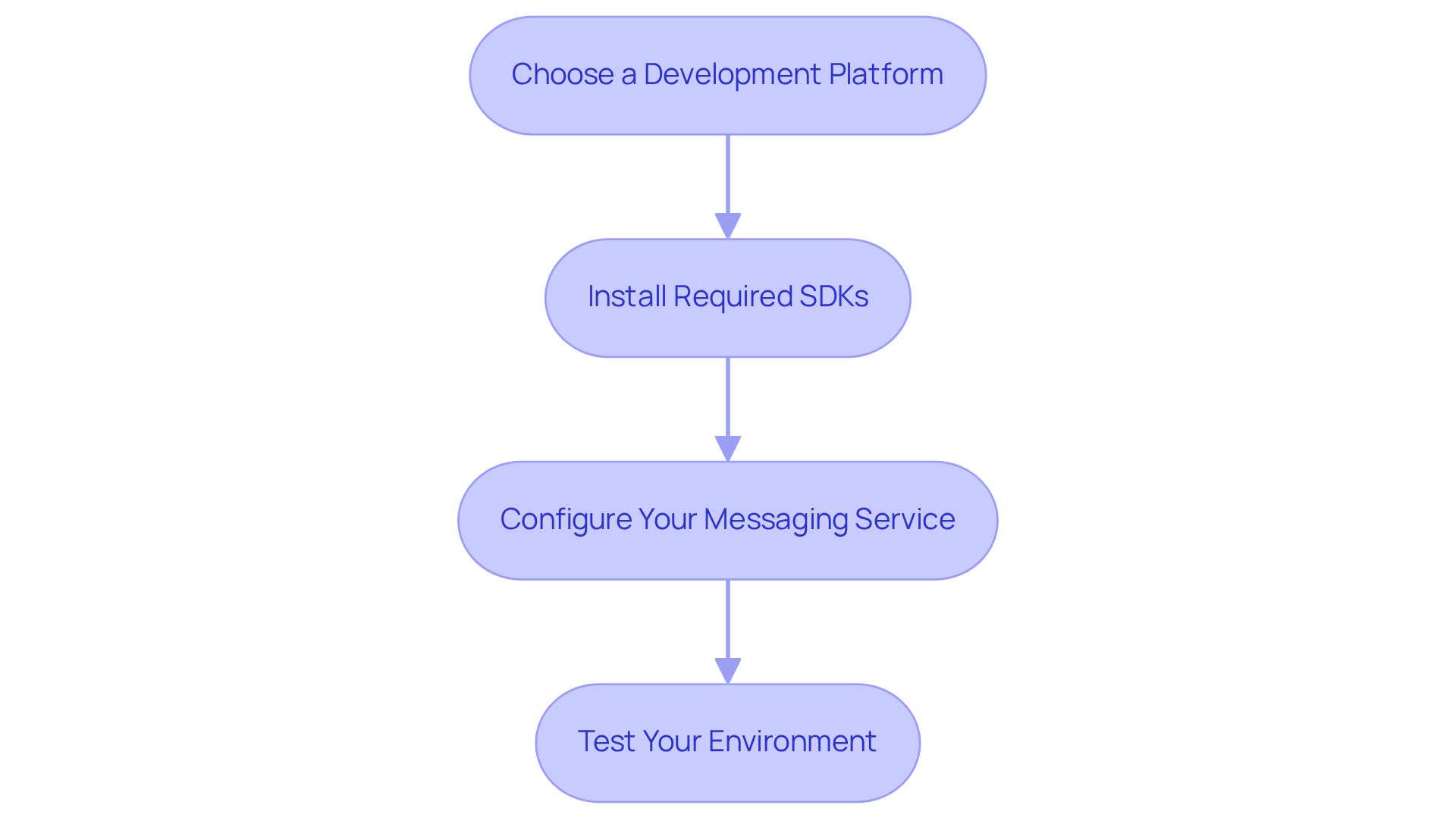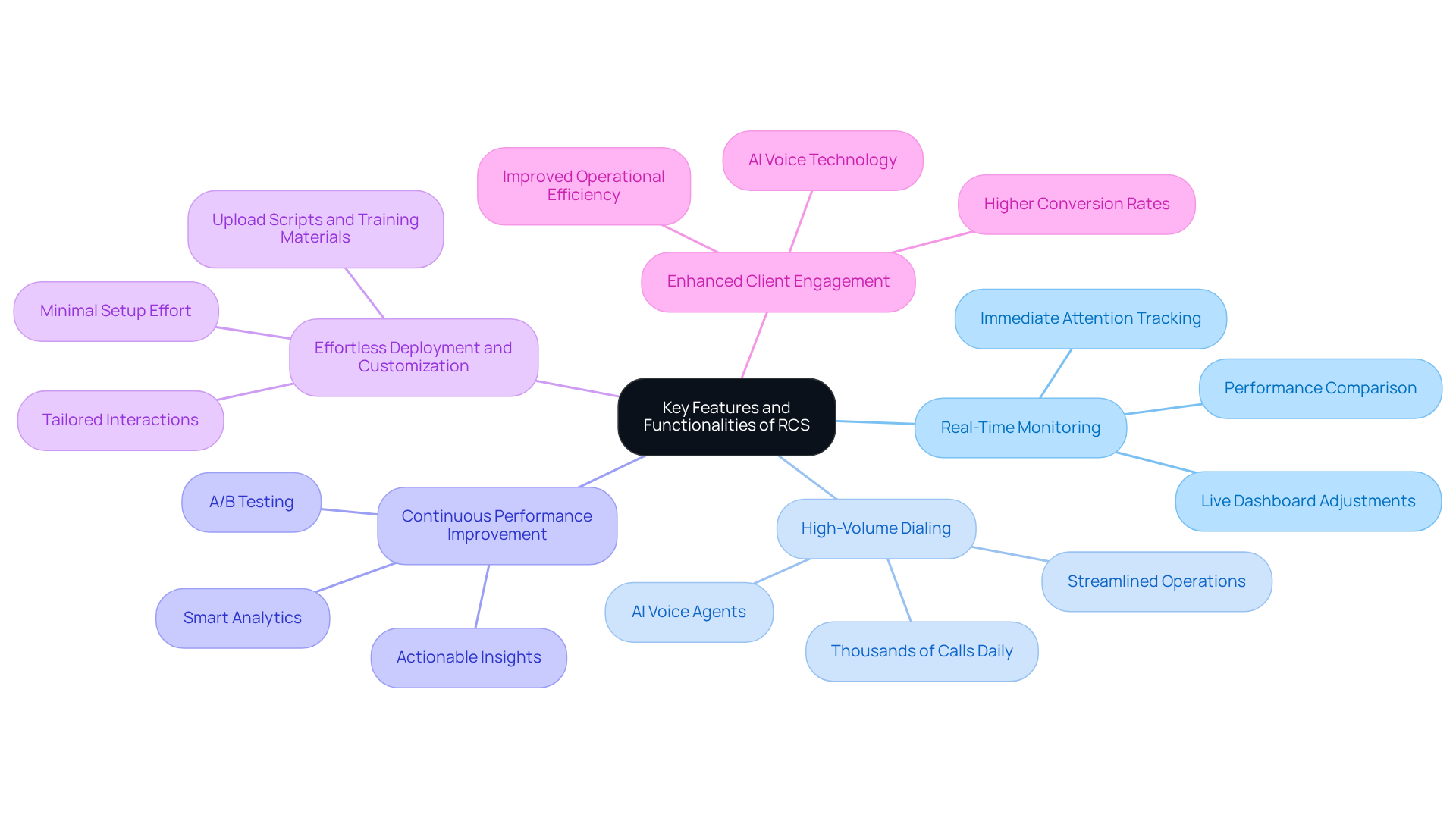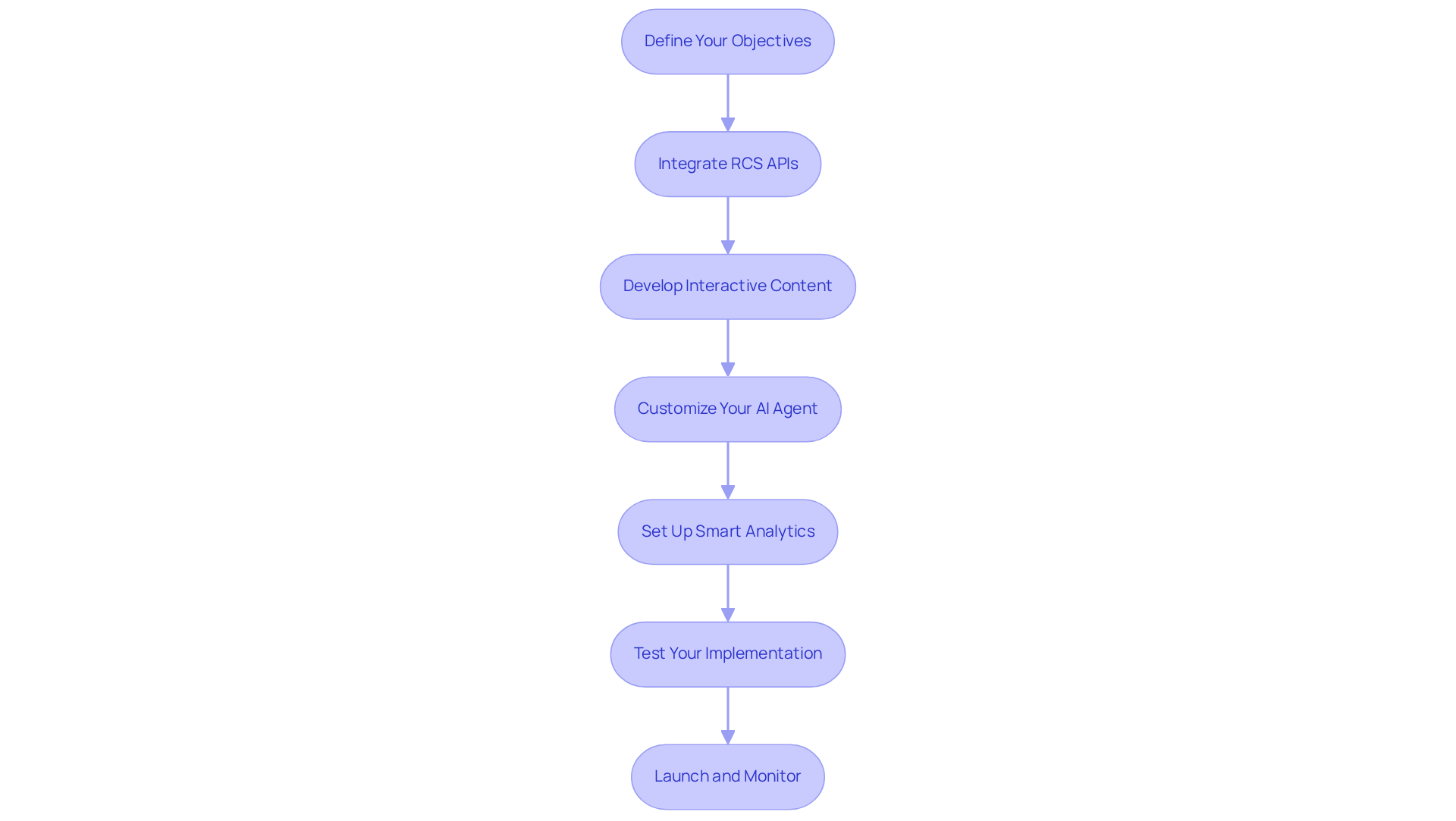Overview
Sales managers in finance can master RCS development by comprehensively understanding its features, establishing an optimal development environment, and effectively implementing it within their applications to enhance client communication. This article delineates essential steps, including:
- The integration of RCS APIs
- The utilization of analytics
These steps collectively support improved engagement and conversion rates through rich media messaging and real-time performance monitoring.
Introduction
The evolution of communication technology has fundamentally transformed how businesses interact with clients, especially within the finance sector. Rich Communication Services (RCS) leads this transformation, delivering a more interactive and enriched messaging experience compared to traditional SMS. This guide explores the essential steps and strategies that sales managers can implement to leverage the power of RCS, enabling them to cultivate deeper client relationships and significantly enhance conversion rates.
However, as organizations endeavor to adopt RCS, they frequently encounter challenges that may impede their success. What are the key obstacles that must be addressed to fully unlock the potential of RCS in enhancing sales communication?
Understand the Basics of Rich Communication Services (RCS)
Rich Communication Services (RCS) developer represents a significant advancement in messaging protocols, enhancing traditional SMS by facilitating richer, more interactive communication. Unlike SMS, which is confined to plain text, RCS empowers users to engage with multimedia content, read receipts, and typing indicators, thereby transforming conversations into more dynamic exchanges. To grasp the full potential of RCS, consider its essential features:
- Rich Media Support: Effortlessly send images, videos, and interactive elements directly within messages.
- Enhanced Engagement: RCS enables branded messaging, significantly elevating user interaction.
- Analytics and Insights: Gain real-time monitoring of message performance and client engagement metrics.
By mastering these fundamentals, sales leaders can leverage the expertise of a rich communication services developer to cultivate more engaging client interactions, ultimately driving higher conversion rates within their transaction processes. Moreover, integrating Intone's AI voice agents amplifies these interactions by delivering real-time feedback and analytics, facilitating high-volume dialing strategies that enhance campaign throughput. With human-like interactions, Intone's AI empowers teams to and re-engage previous clients, transforming the process into a more efficient and impactful experience. Intone's capabilities also allow for the tracking of changes in key metrics and the adjustment of agent behavior, ensuring continuous improvement in performance.

Set Up Your Development Environment for RCS
To establish a robust development environment for RCS, adhere to the following steps:
- Choose a Development Platform: Select a platform that supports RCS, such as Google Cloud or AWS. For a rich communication services developer, the right platform is crucial for leveraging RCS capabilities effectively.
- Install Required SDKs: Download and install the RCS SDK from your chosen platform. This SDK will equip you with the essential libraries and tools necessary for a .
- Configure Your Messaging Service: Set up your messaging service to support RCS. This process may involve configuring APIs and ensuring that your service provider, as a rich communication services developer, is compatible with RCS.
- Test Your Environment: Conduct initial tests to verify that your environment is correctly configured. Utilize sample RCS messages to confirm functionality.
By diligently following these steps, you will lay a strong foundation for becoming a rich communication services developer, which can significantly enhance customer engagement in your commercial processes.

Explore Key Features and Functionalities of RCS
Intone offers several key features that can significantly enhance your sales communication.
- Real-Time Monitoring captures immediate attention, enabling you to track performance and compare agents through a live dashboard. This capability allows for immediate adjustments and optimizations in your sales strategy, ensuring you remain competitive.
- High-Volume Dialing is another critical feature. With the ability to handle thousands of calls daily, Intone's AI voice agents can without the need for additional full-time employees, thus streamlining your operations.
- Continuous Performance Improvement utilizes smart analytics to conduct A/B tests, providing actionable insights that ensure your marketing strategy is always evolving and enhancing. This data-driven approach empowers your team to make informed decisions.
- Effortless Deployment and Customization further solidifies Intone's value. The AI agents can be set up with minimal effort, allowing you to upload scripts and training materials for tailored interactions that meet your business needs. This seamless integration ensures you can start benefiting from AI technology quickly.
- Enhanced Client Engagement is achieved through the utilization of AI voice technology, creating a more engaging experience for clients. This ultimately leads to higher conversion rates and improved operational efficiency.
Testimonials from industry leaders underscore the effectiveness of these features: "Intone’s AI consistently outperforms our human agents — 1.5× more conversions with less overhead," states David, Founder at GCS. By comprehending and employing these features, managers can develop more captivating and efficient communication strategies that connect with clients, achieving improved outcomes in the competitive finance sector.

Implement RCS in Your Applications: A Step-by-Step Approach
To implement RCS in your applications effectively, follow these strategic steps:
- Define Your Objectives: Begin by determining your goals with RCS. Are you aiming to improve lead qualification or enhance client support? Clarity in your objectives is crucial for success.
- Integrate RCS APIs: Leverage the RCS APIs provided by your messaging service to seamlessly integrate RCS capabilities into your application, ensuring a robust foundation for your communication strategy.
- Develop Interactive Content: Craft rich media messages that align with your sales objectives. Ensure these messages are not only engaging but also informative, capturing the attention of your audience.
- Customize Your AI Agent: Tailor your AI agent to meet your business needs by uploading scripts, training materials, and call recordings. This customization enhances client interactions, making them more effective and personalized.
- Set Up Smart Analytics: Establish how the AI agent interacts with clients by configuring data sources, call transfer rules, and post-call reporting. This setup is essential for monitoring performance and optimizing client engagement.
- Test Your Implementation: Conduct thorough testing to verify that RCS communications are sent and received correctly, ensuring all function as intended. This step is vital for a smooth launch.
- Launch and Monitor: Deploy your RCS-enabled application and utilize analytics tools to monitor its performance. Tracking engagement and conversion rates will provide insights into the effectiveness of your implementation.
By following these steps, sales managers can effectively act as rich communication services developers to implement RCS in their applications, leading to improved customer interactions and significantly higher conversion rates.

Troubleshoot Common RCS Development Challenges
When you are a , you may encounter several common challenges that require attention. Here’s how to troubleshoot them effectively:
- Message Delivery Issues: If messages are not being delivered, it is crucial to check your API configurations and ensure that your messaging service supports RCS. This foundational step can prevent significant disruptions in communication.
- Interactive Features Not Working: Verify that your interactive elements are correctly implemented. Additionally, ensure that you are utilizing the latest SDK version, as updates often contain essential fixes and improvements.
- Performance Monitoring: If you observe low engagement rates, it is important to analyze your content and timing. Implement A/B testing to determine what resonates best with your audience, allowing for data-driven adjustments.
- User Experience Problems: Gather feedback from users to identify any issues they face while interacting with RCS messages. Use this feedback to refine your approach, ensuring that user experience is prioritized.
By proactively addressing these challenges, sales managers can ensure a successful implementation of rich communication services developer that not only enhances customer engagement but also drives sales.

Conclusion
Mastering Rich Communication Services (RCS) is essential for sales managers in the finance sector who seek to enhance their communication strategies. By leveraging RCS, professionals can transcend traditional SMS limitations, embracing a more dynamic and engaging form of interaction that fosters better customer relationships and drives higher conversion rates. This evolution in communication enriches client engagement and provides valuable insights through analytics, empowering teams to optimize their outreach efforts effectively.
The article outlines the vital steps for sales managers to successfully adopt RCS, beginning with an understanding of its fundamental features and progressing to the setup of a development environment and implementation within applications. Key insights include:
- The importance of real-time monitoring
- High-volume dialing capabilities
- Continuous performance improvement through smart analytics
By integrating these features, sales managers can craft personalized interactions that resonate with clients, thereby enhancing overall sales effectiveness.
Ultimately, integrating RCS into sales processes signifies a transformative shift in how financial services communicate with their clients. As the landscape of customer engagement continues to evolve, embracing RCS is not merely an option but a necessity for those aiming to remain competitive. Sales managers are urged to take decisive action, explore the capabilities of RCS, and implement these strategies to foster meaningful connections and achieve superior results in their sales endeavors.
Frequently Asked Questions
What is Rich Communication Services (RCS)?
RCS is an advanced messaging protocol that enhances traditional SMS by allowing users to send multimedia content, read receipts, and typing indicators, making conversations more interactive and dynamic.
What are the key features of RCS?
The key features of RCS include rich media support for sending images and videos, enhanced engagement through branded messaging, and analytics for real-time monitoring of message performance and client engagement metrics.
How can sales leaders benefit from RCS?
Sales leaders can leverage RCS to create more engaging client interactions, which can lead to higher conversion rates in their transaction processes.
What role do AI voice agents play in RCS?
AI voice agents, like those from Intone, enhance RCS interactions by providing real-time feedback and analytics, supporting high-volume dialing strategies, and enabling effective upselling and re-engagement of previous clients.
How can one set up a development environment for RCS?
To set up a development environment for RCS, you should choose a development platform that supports RCS, install the required RCS SDK, configure your messaging service to support RCS, and conduct initial tests to verify the configuration.
What platforms can be used for RCS development?
Platforms such as Google Cloud and AWS can be used for RCS development, as they support the necessary capabilities for RCS.
What should be done after installing the RCS SDK?
After installing the RCS SDK, you should configure your messaging service to support RCS, which may involve setting up APIs and ensuring compatibility with your service provider.
Why is testing important in setting up RCS?
Testing is important to verify that your development environment is correctly configured and to confirm the functionality of RCS by using sample messages.






